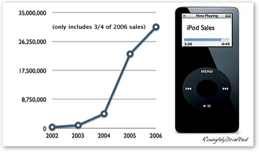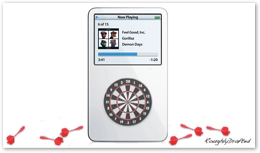
Why Microsoft Can't Compete With iTunes
After reading Why Apple Will Change TV and the supporting Five Ways Why Apple Will Change TV, you might be left wondering why Microsoft won't simply beat Apple to the punch in delivering the future of the television.
Here's the secret answers that expose a series of myths concerning Microsoft’s ability to own new markets, why its monopoly position won't be of any help, and why the company's consumer retail strategies aren't working.
It's a story you'll only read here in RoughlyDrafted Magazine, and a story many people don't want you to hear.
The PC Power of Windows
To the casual observer, Apple certainly seems like a minor player in the PC industry, particularly when compared to Microsoft. The company only has a tiny fraction of the entire PC market share; Gartner assigned Apple a 2.2% share of worldwide PC sales, and 4.8% share of the entire US PC market.
That figure is based solely on hardware sales. In reality, every PC is a combination of two essential components: hardware and operating system software. By only counting hardware sales, the actual use of Linux, BSD, and Mac OS X are unfairly marginalized when simple market share numbers are presented without any context.
The article Market Share Myth: Nailed! split PC sales into the component markets of hardware and operating system software. It therefore assigned Microsoft credit for the software half of all of the Windows PCs sold. It’s not about sales, its about significance.
This brought grief to adherents of the Apple Market Share Myth because considering hardware and software separately gives Apple full credit for selling both, and divides the market share of other hardware makers in half, because, quite obviously, they are each only producing half of the significance of the Windows PC product.
Play Along or Else
What about Linux? No significant number of name brand PCs are sold without Windows, largely because PC makers have signed contracts with Microsoft that assign them points which reduce their volume licensing costs. They earn points by following certain rules Microsoft gives them, including:
-
•conspicuously repeating the cult-like phrase "recommends Windows XP Professional" in all marketing;
-
•never advertising PCs sold without an operating system, or with an alternative OS installed;
-
•applying Windows stickers to all PCs sold, and using a keyboard with a prominent Windows key.





So for example, while Dell does offer certain machines with Linux, it carefully avoids any actual mention of this, and certainly does not advertise the fact. If Dell did, it would have to pay more for each OEM copy of Windows it shipped, which would be a prohibitively expensive experiment for the company. These rules exist to keep Linux from from gaining market traction.

Stabs at Preserving the Monopoly
Along similar lines, it should also come as no surprise why Microsoft is attempting to replace open standards with proprietary ones; it's the only way the company can maintain its monopoly of the PC desktop.
If Microsoft were to open up and license away its Windows APIs, the company would quickly cease to matter. If Microsoft embraced open standards such as OpenGL, rather than its own proprietary DirectX, its stranglehold of PC Gaming would similarly evaporate.
It's not hard to understand why Microsoft also wants to replace every other open standard in computing, from PDF, JPEG, AAC and MP3, into one that is tied to Windows: Metro/XPS, Windows Media Photo, and Windows Media Audio.
This makes it particularly comical when Windows advocates demand that Apple broadly license its iTunes FairPlay system, and try to portray Microsoft as an underdog in the DRM game. The defeat of a huge monopoly does not instantly make it an underdog.
Microsoft merely wants to replace FairPlay with its own DRM, which only offers consumers less choice and more restrictions. Consumers, given a choice, rejected WMA products in the market.
Does every tech company that has earned a majority of sales within a limited product category need to be divested of its business model in order to deliver its success to Microsoft, the monopolist empire which has suffocated all competition in the entire PC industry for well over a decade?
The Power of Monopoly
Interestingly, while Microsoft's monopoly power dominates the PC industry, it didn't achieve that position in the same manner as Apple found success with the iPod. This is very important to understanding why Microsoft can't compete with iTunes.
It has everything to do with choice.
More than 80% of Microsoft's revenues for Windows come from corporate volume licensing and OEM copies of Windows bundled with new PCs. That means the company doesn't have to compete to sell a product at retail.
Instead, it simply makes sure that all PCs sold incorporate its software product, leaving as little room possible for any competition. Preventing competition and choice is essential to maintaining a monopoly.
This effectively turns Windows into a necessary utility for Information Technology managers. In effect, the majority of the tech world needs Windows in order to run normally, just as industry needs water and electricity.
Unplugged from Windows, corporate IT would be in serious trouble and would face enormous costs in building alternative systems. Moving to Linux requires massive expenses in training and retooling. Microsoft is happy to point out in its extensive reports just how expensive any move away from Windows actually costs, with some exaggerations, of course.
Alternative Power Sources
The army of volunteers supporting GNU/Linux contribute real value to the platform, equivalent to many millions of dollars of development and support. Their efforts have progressively challenged Microsoft's position, and should not be underestimated.
In essence, the development of Linux is like a company building its own solar power plant in order to disconnect itself from a municipal power monopoly.
The power might be free, but the effort required to build and maintain an independent system is very expensive.
It would be prohibitively expensive for most companies to build their own power stations. Similarly, in today's PC climate, the only way to challenge the Windows monopoly is to rally Open Source to build an alternative system, mostly as unpaid volunteers.
That's not an example of competition within a functional market; it has more in common with a revolution to overthrow a tyrant!
Retail Competition vs Monopoly Maintenance
If the Windows Monopoly works so well to enrich Microsoft, why didn't the company's collection of WMA partners result in a new WMA monopoly that functioned just as profitably as its Windows PC monopoly?
Clearly that's what Microsoft intended. Instead, they were severely beaten in the marketplace by Apple's rival iPod and iTunes combination. Understanding why this happened requires an investigation of the differences between the PC and iPod markets.
Imagine if Apple licensed the iPod hardware to other manufacturers, and then charged them all licensing fees. This would allow consumers to buy a Creative iPod, a Sony iPod, or a Toshiba iPod. Now imagine a world where playing an MP3 or video file was so complex that the feature could not be easily delivered by rivals. Now imagine that all commercial entertainment was only available through iTunes.
-
•creating a rival operating system is a high risk, decade long task;
-
•all software is tied to a specific platform;
-
•significant effort and expense is required to port applications from one platform to another.
Instead, the iPod competes against a variety of products in the market place, from simple and cheap players to more expensive and extensively featured devices. In this market:
-
•any player can be designed to play standard audio or video files using off the shelf component chips;
-
•common MP3 or MPEG files can play back on any platform;
-
•all commercial entertainment is available on CD and DVD, and can easily be extracted to play back anywhere;
-
•music purchased by the iTunes Store can be effortlessly burned to CD.
Winning in a Competitive Market
Apple competes in an open marketplace with an integrated retail product that includes the iPod, iTunes, and the iTunes store, just as Microsoft did with WMA stores, Windows Media Player and WMA portable devices, or Sony did with its Network Walkman and Connect web store and software.
Given the equal footing in a competitive market, its interesting to discover that Apple not only entered the market later than Microsoft, Real, Creative and others, but also quickly surpassed Microsoft's efforts to extend its monopoly into portable media players and online media sales. Inconceivable!
It is well known how Microsoft previously embraced and extinguished competitors as it entered new markets, most famously with Netscape's web browser and Sun's Java platform.
How was it that the scrappy Apple beat Microsoft in online music and movies? How was Microsoft's omnipotent empire defeated, and is there some chance that Microsoft will still have the opportunity to beat Apple at its own game with Zune, the company's solo effort at developing an iPod killer?
Understanding Apple's success involves examining Microsoft's failures, which the mainstream media seems unwilling to do. Perhaps they haven't been paying attention, or don’t understand what’s happening.
This Series










Tuesday, October 10, 2006





 Bookmark on Del.icio.us
Bookmark on Del.icio.us Discuss on Reddit
Discuss on Reddit Critically review on NewsTrust
Critically review on NewsTrust Forward to Friends
Forward to Friends
 Get RSS Feed
Get RSS Feed Download RSS Widget
Download RSS Widget





